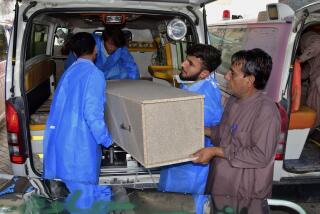Al Qaeda Prisoners Escape in Bus Revolt
- Share via
ISLAMABAD, Pakistan — In a bold and bloody revolt, several dozen Al Qaeda fighters who had been captured at the Pakistani border while trying to flee Afghanistan overcame their guards and grabbed weapons, leading to a shootout in which at least 13 people died and more than 40 prisoners escaped, officials said Wednesday.
Pakistani army soldiers, supported by helicopter gunships, pursued the escapees throughout the day, capturing 21 by nightfall, officials said. At least 20 others, however, vanished into the hills around the western Pakistani town of Parachinar.
The mutiny, which came as the captives were being transported to a prison in Pakistan’s Northwest Frontier Province, reinforced the reputation for ruthlessness and violence on the part of the fighters for the terrorist network.
It was the second deadly revolt staged by captured Al Qaeda and Taliban fighters. Near the northern Afghan city of Mazar-i-Sharif, pro-Taliban prisoners rebelled in November. CIA officer Johnny “Mike” Spann was killed during that uprising.
The fighters who escaped Wednesday, most of them Arabs and other foreigners, had been held in prison camps in Parachinar overnight. They had been arrested over the last few days as they crossed the border from eastern Afghanistan’s Tora Bora region into Pakistan, according to a statement by the government of the province, which runs along much of the 1,400-mile divide between the two countries.
The Al Qaeda fighters, 156 in all, were being transported on several buses from Parachinar to a nearby holding facility when the shooting began, officials said.
“One of the Arabs shouted ‘Allahu akbar!’ [Arabic for “God is great”] and, with that slogan, the others attacked,” bus driver Rehman Ali told the Associated Press.
The 48 prisoners on Ali’s bus wrested the guns from their captors and shot them. After seizing control of the bus, the prisoners tried to drive away but crashed moments later, authorities said. They then poured out of the bus as guards from other buses in the small convoy opened fire.
Authorities said that some of the fighters fired back, some fled, and others hunkered down until the shooting stopped and surrendered again.
The provincial government said that seven prisoners and six security officials were dead by the time the shooting ended.
There was tighter security Wednesday all along Pakistan’s border with Afghanistan in order to net Al Qaeda fighters, including leader Osama bin Laden, who has managed to elude capture.
But the border procedures were surprisingly lax.
In Afghanistan, across from the Pakistani city of Chaman, there was no border control at all.
On the Pakistani side, guards glance into car windows and then wave each vehicle through the frontier if its occupants look vaguely like Pakistanis or Afghans.
Despite reports suggesting that the Afghan-Pakistani border is proving to be a porous one for fighters fleeing Tora Bora, U.S. Defense Secretary Donald H. Rumsfeld said Wednesday that the Pakistani army has arrested “several hundred” Al Qaeda members along the border and that many others have been killed. Nearly all those arrested are non-Afghan and non-Pakistani, he said.
“They’re still fighting in some cases. Some have gotten across borders. A lot have been killed. A good number has been captured most recently,” Rumsfeld said at the Pentagon after returning from a trip to Central Asia and Brussels. “There are something like . . . seven battalions of Pakistani army officials along that border who are doing that job.”
He refused to say whether U.S. forces are on the ground in Pakistan to help in the search for Al Qaeda forces and Bin Laden. He did confirm a report in The Times that the United States is using airborne intelligence-gathering equipment over Pakistan in the search.
Rumsfeld said that as more are taken prisoner, U.S. Marines at the airport in the former Taliban stronghold of Kandahar are expanding a detention facility there to accommodate 500.
He appeared to grow testy at the suggestion that Bin Laden has vanished.
“I don’t know that. I don’t think he’s vanished. He’s either dead in some tunnel, or he’s alive. And if he’s alive, he’s either in Afghanistan or he isn’t. And it does not matter--we’ll find him someday.
“He is not the problem, the entire problem. The Al Qaeda is the entire problem. . . . He is important. We’re after him. We intend to find him. I believe we will. But we haven’t.”
At the White House, President Bush renewed his pledge to hunt down Bin Laden and said the terrorist leader had underestimated America’s resolve.
“And they’re paying a terrible price for their miscalculation,” Bush said. “We’re making great progress in the first theater of this long war to rout terror where it may exist.”
Bush spoke during a brief South Lawn ceremony in which a new firetruck was unveiled--as a present from the people of Louisiana to New York City.
Also on hand was that state’s governor, Mike J. Foster, who is an avid rabbit hunter, which prompted this remark from the president:
“Sometimes those rabbits think they can hide from the governor. But eventually he smokes them out and gets them--and that’s exactly what’s happening to Mr. Bin Laden and all the murderers that he’s trying to hide in Afghanistan.”
On the issue of the next front in the war on terrorism, Rumsfeld denied a report quoting an unnamed German official as saying that Somalia will be targeted next. Somalia is one of several countries identified by U.S. officials as havens for Al Qaeda members.
The suggestion is “nonsense,” he said. “The German is wrong.”
*
Slater reported from Islamabad and Daniszewski from Quetta. Times staff writers John Hendren and Edwin Chen in Washington contributed to this report.
More to Read
Sign up for Essential California
The most important California stories and recommendations in your inbox every morning.
You may occasionally receive promotional content from the Los Angeles Times.










